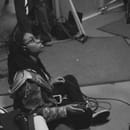There are quite a few people who anticipate the spring season. They welcome the warmer weather, the flowers and other plant life revived from the dead and get the inspiration to clean and declutter their lives. Here in Florida, where this weather appears much sooner than in other places, some, much like myself quite frankly dread the spring-like weather at the beginning of the year, as it marks the start of outdoor allergies. The pollen particularly causes many issues for us trying to go about our daily lives.
Recognized as the yellow dust that coats everything from cars to the sidewalks and falls from the trees in little brownish bunches, it’s followed by sneezing, runny noses and other more serious allergy and respiratory complications, like asthma and bronchitis. Walking around campus is a nightmare as you realize it’s in the air too, and you can smell it as well as have it sticking to your exposed clothes and hair.
As a sufferer of both asthmatic, sinus, and indoor and outdoor allergies, there isn’t a time of year where I’m not wiping my nose or dealing with unpleasant drainage. However, this year has been different from past years, and armed with newfound knowledge and old techniques, here are some of the things I’m doing to help me get through this season relatively unscathed.
1. The antihistamine
Antihistamine is the active ingredient in medications like Zyrtec, Claritin, Alavert and other over the counter medications. This helps alleviate the major allergy symptoms. In searching how to better equip myself, I found out that while you can take these medications when you’re in the thick of things, it’s actually best to take them BEFORE your sneezing/coughing/congestion/itching fit. My go-to over the counter med is the Walmart brand Zyrtec, and along with taking it at the end of January, right before the start of allergy season, I alternate between that and ibuprofen, depending on how I feel during the week.
2. Washing your hands and hair & changing clothes when you get home
You’re outside, walking to classes, meetings and more, which involve some interaction with the outdoor elements. The wind too blows most likely, but even when it’s not, you’re still exposing your clothes, shoes, and uncovered skin to the great outdoors. The moment I come home and stay for the rest of the day, I shower and change into new clothes, and when I wear glasses, I wipe those off as well. In the event that I have to come home and leave again, I always make sure to wash my hands, and stay as far away from my bed and desk area when I have to enter my room. The less contact with your sleeping quarters, the better!
3. Whatever you do, don’t touch your face!!
This one is self-explanatory, but since I’m guilty of this as well, I’ll add it to this list. Don’t touch your face, as this keeps the transfer of the pollen from your eyes, mouth and nose.
4. Increase your water intake
It also doesn’t hurt to drink tea with lemon and honey, and drink orange juice or eat oranges for your immune system. I usually have issues drinking enough water in general, since I hate frequently using the restroom. However, water helps flush out your system, keeps you hydrated and helps lessen the production of excess mucus, so I swallow my pride and drown more than my fair share of water.
5. Be grateful for rainy days
Rainy days are your best friend and they help to wash the pollen out of the air. Everyone has their own opinions about the rain, and while I’m not a fan, I quickly change my tune in the spring months as this renders the air clean and free of irritants that would otherwise cause issues.
6. Invest in a Neti Pot
The Neti Pot is a saline solution that’s poured into a plastic container. You can find it at the drug store or grocery store that can be used to rinse out your nose. There are plenty of YouTube videos and instructional how-tos on the Internet on the proper use of a neti pot. Essentially, you pour a warm solution into one nostril, and the water flows out of the opposite one. I try to do this every night or every couple of nights, and it does wonders.
7. Check the pollen count each day
You can also try to stay inside when the pollen count is especially high and plan your day around it if possible. As much as I’d prefer to stay inside all day long and never see the light of day, that’s just not possible. Therefore, I do a simple Google search using the zip code and pull up the pollen count for the day. Sometimes I’ll check the five-day forecast. On the days that the count is especially high (in the red) and I can stay indoors, I do so.
Hopefully these tips will equip you with the necessary tools to face the pollen season. Go forth and conquer!
Images: 1, 2 taken by author



